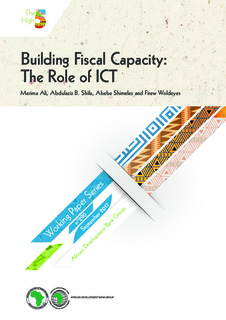| dc.contributor.author | Ali, Merima | |
| dc.contributor.author | Shifa, Abdulaziz B. | |
| dc.contributor.author | Shimeles, Abebe | |
| dc.contributor.author | Woldeyes, Firew | |
| dc.date.accessioned | 2018-01-12T15:00:22Z | |
| dc.date.available | 2018-01-12T15:00:22Z | |
| dc.date.issued | 2017-01-01 | |
| dc.identifier | oai:www.cmi.no:6408 | |
| dc.identifier.citation | African Development Bank Group (Working Paper, # 290) | |
| dc.identifier.uri | http://hdl.handle.net/11250/2477322 | |
| dc.description.abstract | Weak fiscal capacity for domestic resource mobilization is the hallmark of poor countries. Recently, many developing countries resorted to the application of information technology to consolidate tax mobilization; however, there is little systematic empirical evidence on the impact of such reforms. We attempt to narrow this gap by providing evidence from Ethiopia where there has been a recent surge in the use of electronic sales register machines (ESRMs). We use a unique administrative firm-level panel data covering all business taxpayers in Ethiopia and applied matching difference-in-difference method to account for possible bias that may arise due to firm’s selection into ESRM adoption. We find that adoption of ESRMs increases tax payments and reported sales significantly. Moreover, we find a positive effect on employment and no effect on net entry, suggesting that increased tax payments by registered taxpayers occurred without erosion of the tax base. | |
| dc.language.iso | eng | |
| dc.publisher | African Development Bank Group, WP # 290 | |
| dc.relation.uri | https://www.cmi.no/publications/6408-building-fiscal-capacity-the-role-of-ict | |
| dc.title | Building Fiscal Capacity:The Role of ICT | |
| dc.type | Research report | |
